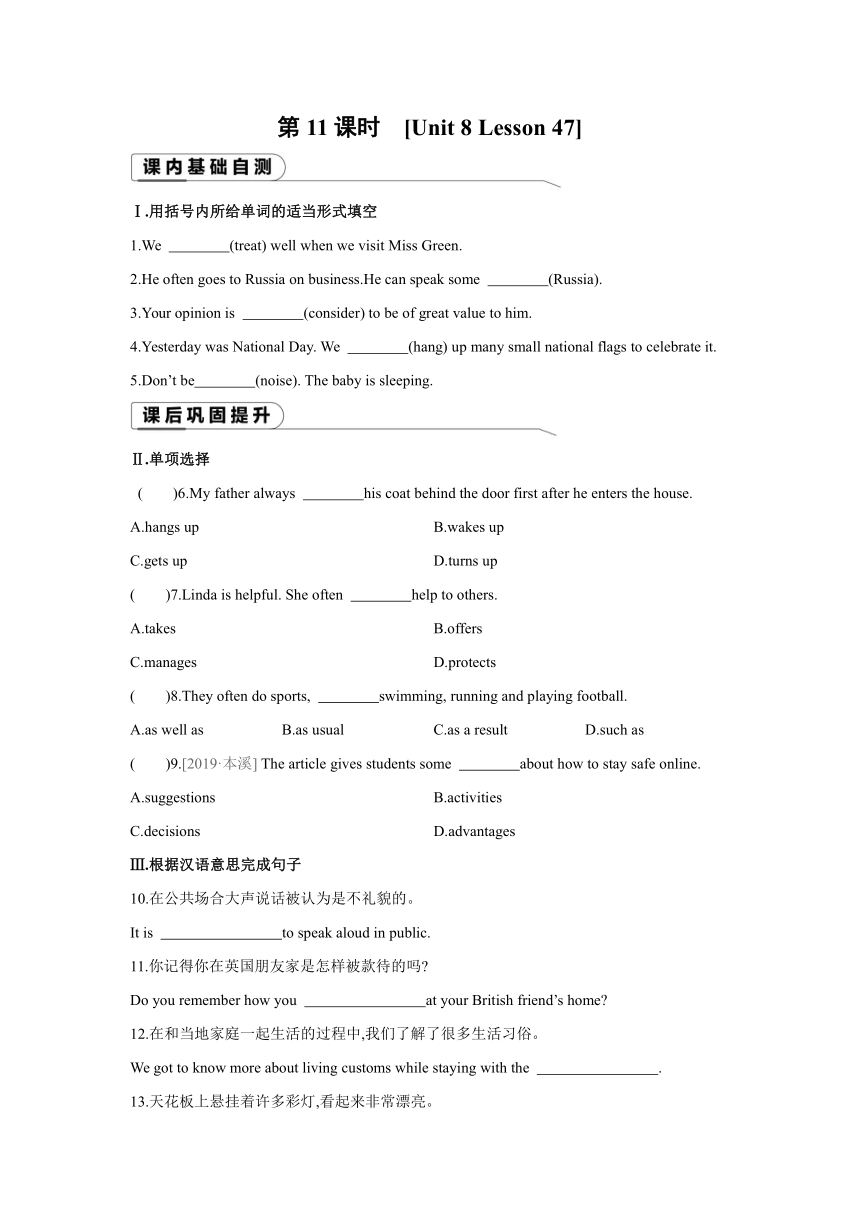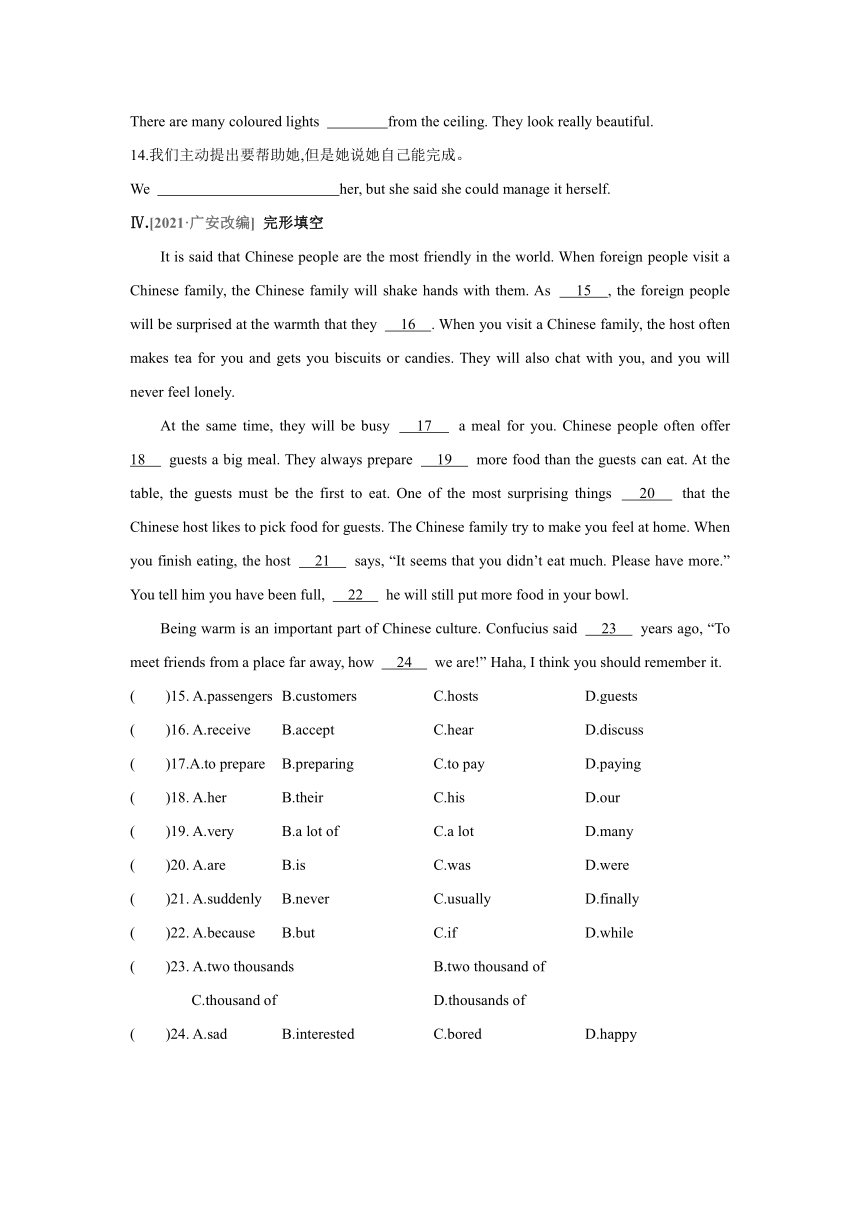冀教版英语九年级下册课课练:Unit 8 Culture Shapes Us Lesson 47(含答案)
文档属性
| 名称 | 冀教版英语九年级下册课课练:Unit 8 Culture Shapes Us Lesson 47(含答案) |

|
|
| 格式 | docx | ||
| 文件大小 | 56.5KB | ||
| 资源类型 | 教案 | ||
| 版本资源 | 冀教版 | ||
| 科目 | 英语 | ||
| 更新时间 | 2022-07-20 16:41:17 | ||
图片预览


文档简介
第11课时 [Unit 8 Lesson 47]
Ⅰ.用括号内所给单词的适当形式填空
1.We (treat) well when we visit Miss Green.
2.He often goes to Russia on business.He can speak some (Russia).
3.Your opinion is (consider) to be of great value to him.
4.Yesterday was National Day. We (hang) up many small national flags to celebrate it.
5.Don’t be (noise). The baby is sleeping.
Ⅱ.单项选择
( )6.My father always his coat behind the door first after he enters the house.
A.hangs up B.wakes up
C.gets up D.turns up
( )7.Linda is helpful. She often help to others.
A.takes B.offers
C.manages D.protects
( )8.They often do sports, swimming, running and playing football.
A.as well as B.as usual C.as a result D.such as
( )9.[2019·本溪] The article gives students some about how to stay safe online.
A.suggestions B.activities
C.decisions D.advantages
Ⅲ.根据汉语意思完成句子
10.在公共场合大声说话被认为是不礼貌的。
It is to speak aloud in public.
11.你记得你在英国朋友家是怎样被款待的吗
Do you remember how you at your British friend’s home
12.在和当地家庭一起生活的过程中,我们了解了很多生活习俗。
We got to know more about living customs while staying with the .
13.天花板上悬挂着许多彩灯,看起来非常漂亮。
There are many coloured lights from the ceiling. They look really beautiful.
14.我们主动提出要帮助她,但是她说她自己能完成。
We her, but she said she could manage it herself.
Ⅳ.[2021·广安改编] 完形填空
It is said that Chinese people are the most friendly in the world. When foreign people visit a Chinese family, the Chinese family will shake hands with them. As 15 , the foreign people will be surprised at the warmth that they 16 . When you visit a Chinese family, the host often makes tea for you and gets you biscuits or candies. They will also chat with you, and you will never feel lonely.
At the same time, they will be busy 17 a meal for you. Chinese people often offer 18 guests a big meal. They always prepare 19 more food than the guests can eat. At the table, the guests must be the first to eat. One of the most surprising things 20 that the Chinese host likes to pick food for guests. The Chinese family try to make you feel at home. When you finish eating, the host 21 says, “It seems that you didn’t eat much. Please have more.” You tell him you have been full, 22 he will still put more food in your bowl.
Being warm is an important part of Chinese culture. Confucius said 23 years ago, “To meet friends from a place far away, how 24 we are!” Haha, I think you should remember it.
( )15. A.passengers B.customers C.hosts D.guests
( )16. A.receive B.accept C.hear D.discuss
( )17.A.to prepare B.preparing C.to pay D.paying
( )18. A.her B.their C.his D.our
( )19. A.very B.a lot of C.a lot D.many
( )20. A.are B.is C.was D.were
( )21. A.suddenly B.never C.usually D.finally
( )22. A.because B.but C.if D.while
( )23. A.two thousands B.two thousand of
C.thousand of D.thousands of
( )24. A.sad B.interested C.bored D.happy
答案
课内基础自测
Ⅰ.1.are treated 2.Russian 3.considered 4.hung 5.noisy
课后巩固提升
Ⅱ.6—9 ABDA
Ⅲ.10.considered rude 11.were treated 12.local family 13.hanging 14.offered to help
Ⅳ.【主旨大意】 本文是一篇说明文,主要介绍了外国人在中国家庭做客时,受到中国家庭热情款待的情况,并展示了一些中国人的待客之道和饮食习俗以及礼节。
15.D 名词词义辨析。句意:作为客人,外国人会对他们所受到的热情招待而感到惊讶。passenger意为“乘客”;customer意为“顾客”;host意为“主人”;guest意为“客人”。根据上文“When foreign people visit a Chinese family, the Chinese family will shake hands with them.”可知,外国人拜访中国的家庭,因此外国人应该是“客人”,
16.A 动词词义辨析。receive意为“收到;受到”;accept意为“接受”;hear意为“听”;discuss意为“讨论”。根据下文“When you visit a Chinese family, the host often makes tea for you and gets you biscuits or candies. They will also chat with you, and you will never feel lonely.”可知,此处指外国人“受到”的款待。
17.B 动词词义辨析和非谓语动词的用法。句意:同时,他们会忙着为你准备饭菜。根据上文“When you visit a Chinese family, the host often makes tea for you and gets you biscuits or candies.”可知,在中国家庭做客,主人为客人准备茶和甜点之后,应该是开始“准备”饭菜,故用动词prepare。be busy doing sth.意为“忙于做某事”。
18.B 代词词义辨析。句意:中国人经常给客人提供一份大餐。主语是Chinese people,为复数名词,故此处应用物主代词their指代,意为“他们的”,
19.C 词语辨析。句意:他们准备的食物总是比客人吃的多得多。very意为“非常”,常用来修饰形容词;a lot of 意为“许多”,修饰可数名词复数或不可数名词;a lot意为“很;非常”,修饰形容词或副词的比较级;many意为“许多”,修饰可数名词复数。由句中的than可知,此处是修饰比较级more(更多的),应用a lot。
20.B 主谓一致和动词的时态。句意:最令人惊讶的事情之一是,中国主人喜欢为客人夹菜。one of…意为“……之一”,of后跟可数名词复数或代词复数,谓语动词要用单数形式;此处是陈述事实,应用一般现在时,
21.C 副词词义辨析。句意:当你吃完后,主人通常会说:“你好像没吃多少,请多吃点。”suddenly意为“突然”;never意为“从不”;usually意为“通常”;finally意为“最后”。根据“It seems that you didn’t eat much. Please have more.”及生活常识可知,这是中国人“通常”劝客人多吃东西的说法,
22.B 连词词义辨析。句意:……但他还是会在你的碗里放更多的食物。because意为“因为”;but意为“但是”;if意为“如果”;while意为“当……时”。根据上文“你告诉他你已经吃饱了”可知,空格前后分句之间是转折关系,应用but连接,
23.D 数词的用法。句意:孔子在几千年前就说过……thousand意为“千”,其前有具体数字two时,thousand之后不加-s,也不与of连用,故排除选项A和B;thousands of表示约数,意为“成千上万的”。
24.D 形容词词义辨析。句意:有朋自远方来,不亦乐乎!sad意为“伤心的”;interested意为“感兴趣的”;bored意为“无聊的”;happy意为“开心的”。根据句意可知,此处表达的是开心的,
Ⅰ.用括号内所给单词的适当形式填空
1.We (treat) well when we visit Miss Green.
2.He often goes to Russia on business.He can speak some (Russia).
3.Your opinion is (consider) to be of great value to him.
4.Yesterday was National Day. We (hang) up many small national flags to celebrate it.
5.Don’t be (noise). The baby is sleeping.
Ⅱ.单项选择
( )6.My father always his coat behind the door first after he enters the house.
A.hangs up B.wakes up
C.gets up D.turns up
( )7.Linda is helpful. She often help to others.
A.takes B.offers
C.manages D.protects
( )8.They often do sports, swimming, running and playing football.
A.as well as B.as usual C.as a result D.such as
( )9.[2019·本溪] The article gives students some about how to stay safe online.
A.suggestions B.activities
C.decisions D.advantages
Ⅲ.根据汉语意思完成句子
10.在公共场合大声说话被认为是不礼貌的。
It is to speak aloud in public.
11.你记得你在英国朋友家是怎样被款待的吗
Do you remember how you at your British friend’s home
12.在和当地家庭一起生活的过程中,我们了解了很多生活习俗。
We got to know more about living customs while staying with the .
13.天花板上悬挂着许多彩灯,看起来非常漂亮。
There are many coloured lights from the ceiling. They look really beautiful.
14.我们主动提出要帮助她,但是她说她自己能完成。
We her, but she said she could manage it herself.
Ⅳ.[2021·广安改编] 完形填空
It is said that Chinese people are the most friendly in the world. When foreign people visit a Chinese family, the Chinese family will shake hands with them. As 15 , the foreign people will be surprised at the warmth that they 16 . When you visit a Chinese family, the host often makes tea for you and gets you biscuits or candies. They will also chat with you, and you will never feel lonely.
At the same time, they will be busy 17 a meal for you. Chinese people often offer 18 guests a big meal. They always prepare 19 more food than the guests can eat. At the table, the guests must be the first to eat. One of the most surprising things 20 that the Chinese host likes to pick food for guests. The Chinese family try to make you feel at home. When you finish eating, the host 21 says, “It seems that you didn’t eat much. Please have more.” You tell him you have been full, 22 he will still put more food in your bowl.
Being warm is an important part of Chinese culture. Confucius said 23 years ago, “To meet friends from a place far away, how 24 we are!” Haha, I think you should remember it.
( )15. A.passengers B.customers C.hosts D.guests
( )16. A.receive B.accept C.hear D.discuss
( )17.A.to prepare B.preparing C.to pay D.paying
( )18. A.her B.their C.his D.our
( )19. A.very B.a lot of C.a lot D.many
( )20. A.are B.is C.was D.were
( )21. A.suddenly B.never C.usually D.finally
( )22. A.because B.but C.if D.while
( )23. A.two thousands B.two thousand of
C.thousand of D.thousands of
( )24. A.sad B.interested C.bored D.happy
答案
课内基础自测
Ⅰ.1.are treated 2.Russian 3.considered 4.hung 5.noisy
课后巩固提升
Ⅱ.6—9 ABDA
Ⅲ.10.considered rude 11.were treated 12.local family 13.hanging 14.offered to help
Ⅳ.【主旨大意】 本文是一篇说明文,主要介绍了外国人在中国家庭做客时,受到中国家庭热情款待的情况,并展示了一些中国人的待客之道和饮食习俗以及礼节。
15.D 名词词义辨析。句意:作为客人,外国人会对他们所受到的热情招待而感到惊讶。passenger意为“乘客”;customer意为“顾客”;host意为“主人”;guest意为“客人”。根据上文“When foreign people visit a Chinese family, the Chinese family will shake hands with them.”可知,外国人拜访中国的家庭,因此外国人应该是“客人”,
16.A 动词词义辨析。receive意为“收到;受到”;accept意为“接受”;hear意为“听”;discuss意为“讨论”。根据下文“When you visit a Chinese family, the host often makes tea for you and gets you biscuits or candies. They will also chat with you, and you will never feel lonely.”可知,此处指外国人“受到”的款待。
17.B 动词词义辨析和非谓语动词的用法。句意:同时,他们会忙着为你准备饭菜。根据上文“When you visit a Chinese family, the host often makes tea for you and gets you biscuits or candies.”可知,在中国家庭做客,主人为客人准备茶和甜点之后,应该是开始“准备”饭菜,故用动词prepare。be busy doing sth.意为“忙于做某事”。
18.B 代词词义辨析。句意:中国人经常给客人提供一份大餐。主语是Chinese people,为复数名词,故此处应用物主代词their指代,意为“他们的”,
19.C 词语辨析。句意:他们准备的食物总是比客人吃的多得多。very意为“非常”,常用来修饰形容词;a lot of 意为“许多”,修饰可数名词复数或不可数名词;a lot意为“很;非常”,修饰形容词或副词的比较级;many意为“许多”,修饰可数名词复数。由句中的than可知,此处是修饰比较级more(更多的),应用a lot。
20.B 主谓一致和动词的时态。句意:最令人惊讶的事情之一是,中国主人喜欢为客人夹菜。one of…意为“……之一”,of后跟可数名词复数或代词复数,谓语动词要用单数形式;此处是陈述事实,应用一般现在时,
21.C 副词词义辨析。句意:当你吃完后,主人通常会说:“你好像没吃多少,请多吃点。”suddenly意为“突然”;never意为“从不”;usually意为“通常”;finally意为“最后”。根据“It seems that you didn’t eat much. Please have more.”及生活常识可知,这是中国人“通常”劝客人多吃东西的说法,
22.B 连词词义辨析。句意:……但他还是会在你的碗里放更多的食物。because意为“因为”;but意为“但是”;if意为“如果”;while意为“当……时”。根据上文“你告诉他你已经吃饱了”可知,空格前后分句之间是转折关系,应用but连接,
23.D 数词的用法。句意:孔子在几千年前就说过……thousand意为“千”,其前有具体数字two时,thousand之后不加-s,也不与of连用,故排除选项A和B;thousands of表示约数,意为“成千上万的”。
24.D 形容词词义辨析。句意:有朋自远方来,不亦乐乎!sad意为“伤心的”;interested意为“感兴趣的”;bored意为“无聊的”;happy意为“开心的”。根据句意可知,此处表达的是开心的,
同课章节目录
- Unit 7 Work for Peace
- Lesson 37 Don't Fight!
- Lesson 38 Making School a Better Place
- Lesson 39 The Dove and the Olive Branch
- Lesson 40 The UN—Power of Words
- Lesson 41 Jenny's Good Advice
- Lesson 42 Peace at Last
- Unit Review
- Unit 8 Culture Shapes Us
- Lesson 43 A Visit to Chinatown
- Lesson 44 Popular Sayings
- Lesson 45 Different Manners
- Lesson 46 Home to Many Cultures
- Lesson 47 Good Manners
- Lesson 48 Supper with the Bradshaws
- Unit Review
- Unit 9 Communication
- Lesson 49 Get Along with Others
- Lesson 50 Tips for Good Communication
- Lesson 51 What Could Be Wrong?
- Lesson 52 The Power of a Smile
- Lesson 53 Working in Groups
- Lesson 54 How Embarrassing!
- Unit Review
- Unit 10 Get Ready for the Future
- Lesson 55 Look into the Future
- Lesson 56 Manage Your Time
- Lesson 57 Best Wishes
- Lesson 58 Ms.Liu's Speech
- Lesson 59 Keep Your Choices Open
- Lesson 60 Get a Good Education
- Unit Review
